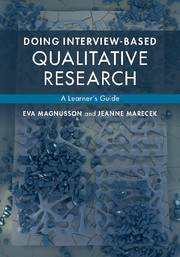Book contents
- Frontmatter
- Contents
- 1 Introduction
- 2 Some examples of interpretative research
- 3 Planning and beginning an interpretative research project
- 4 Making decisions about participants
- 5 Designing the interview guide
- 6 Doing the interview
- 7 Preparing for analysis
- 8 Finding meanings in people's talk
- 9 Analyzing stories in interviews
- 10 Analyzing talk-as-action
- 11 Analyzing for implicit cultural meanings
- 12 Reporting your project
- Epilogue
- References
- Index
12 - Reporting your project
Published online by Cambridge University Press: 05 October 2015
- Frontmatter
- Contents
- 1 Introduction
- 2 Some examples of interpretative research
- 3 Planning and beginning an interpretative research project
- 4 Making decisions about participants
- 5 Designing the interview guide
- 6 Doing the interview
- 7 Preparing for analysis
- 8 Finding meanings in people's talk
- 9 Analyzing stories in interviews
- 10 Analyzing talk-as-action
- 11 Analyzing for implicit cultural meanings
- 12 Reporting your project
- Epilogue
- References
- Index
Summary
In this chapter, we turn to the matter of composing the final research report. We focus mainly on composing reports about students' projects (such as doctoral dissertations, master's theses, or undergraduate theses) and manuscripts intended for scholarly journals. The focus here is on how to write a report. However, writing is not confined to the end of a project. As you have learned, an interpretative research project involves writing from the very first stage of the research process. Put simply, writing is part of the research process and cannot be separated from it. This is why we have urged you to keep a research journal from the beginning and to write notes and reflections in it at every stage of your project. You will have been doing two kinds of writing: the first kind comprises the notes, reflections, and hunches in your research journal, and the second has involved writing down summaries of and notes about the results that you produced as you carried out your analyses. The latter includes the documentation of your interpretations in the form of descriptive notes, integrative summaries, and the like.
There are a number of benefits to recognizing that writing is a continual process that is integral to carrying out every phase of a project. First, by writing continually, you continually compel yourself to clarify your thinking. Second, writing notes about your process, as well as noting down the intermediate steps by which you arrived at the results of your analyses, provides a thorough record of the judgments and decisions that you made at each step of the project. Third, the notes afford a source of evidence that your work has been done with care and thoroughness. There is a fourth reason behind the writing you have done. This one is pragmatic, and you are now at a stage to capitalize on it: Many parts of the writing you have done can serve as the basic material for parts of your report.
- Type
- Chapter
- Information
- Doing Interview-based Qualitative ResearchA Learner's Guide, pp. 166 - 177Publisher: Cambridge University PressPrint publication year: 2015



